Talking COSMOPOLIS with Cronenberg, Pattinson, Giamatti and co.
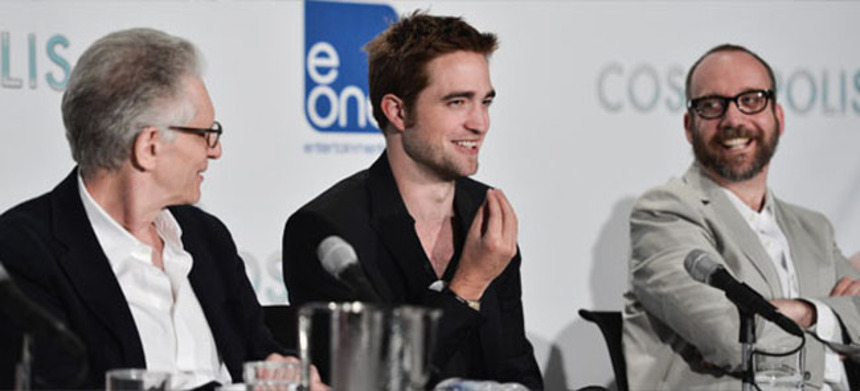
Cosmopolis marks a return of sorts for David Cronenberg to tackling what some consider to be "unfilmable" books. It's hard not to tie this film directly to the other (I'd argue far more successful) works Crash and Naked Lunch. In the earlier pieces, he took bold, brash, clearly provocative and interesting works and managed to inject his trademark wit and sensibilities in the translation to screen.
While Cosmopolis is marked by the Director's welcome flourishes, it suffers from being a slightly pedantic take on wealth, envy and isolation. Naturally, this the very tone and conceit that's directly attributable to DeLillo's source material, and I feel that most of my faults with the work probably lie with the pedantry of the source material, and I was left with the feeling that it simply doesn't live up to the lofty goals it seems to wish to set.
As with most of Cronenberg's films, it's a work demanding of more than one viewing to fully evaluate, with a superficially simply narrative arc underpinned by heady, intricate dialogue, but I must admit that on first blush I was actually quite disappointed in the film.
Joined by his producer and the principal cast, Cronenberg spoke in his usual sardonic about working with source material of this type, his use of special directing software to make everything go smoothly, and, of course, baby whales.
******************************
On preparing for their roles
Emily Hampshire - It was good that we all had these mini movies. It was nice to be contained in that way. I think having all our stuff shot together, our whole story line, in order.
I wasn't sure what I was more excited about, having David bend over me and show Rob how to give a prostate exam, or Rob bending over me.
David Cronenberg - You don't have to choose, really.
Hampshire - My friend Jay Baruchel had shot a few days before me, so I called him and said, "What is David going to be like on set?", and he said that he doesn't direct, and not to be offended if he doesn't say anything after my scene. I was very glad to have that kind of preparation, because I think I might have cried if I just did that scene and he said nothing.
We were in this limo, and had this microphone wired in that David would direct from, and it sounded like the voice of God coming in. To just hear "again"was just terrifying.
Cronenberg - I hope the snoring didn't bother you.
Cronenberg took all of six days to transform the DeLillo book to script
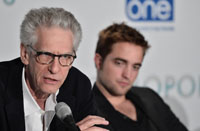 Cronenberg - The typical Don DeLillo dialogue was the backbone of it, which is realistic, because Americans do speak that way, but also very stylized. I think of it as Pinteresque in that it has a real stylized rhythm and tone that you can recognize from a mile away, and that the punctuation really matters.
Cronenberg - The typical Don DeLillo dialogue was the backbone of it, which is realistic, because Americans do speak that way, but also very stylized. I think of it as Pinteresque in that it has a real stylized rhythm and tone that you can recognize from a mile away, and that the punctuation really matters.I literally had the book here, and the computer here, and I transcribed all the dialogue and put it into screenplay form, and looked at it and said, "is this a movie or not?", and I thought, "yeah, it actually is". The next three days I just put in all the action stuff.
When I met DeLillo finally, he hadn't had any contact with him until that time, he said that he was really interested in now I was going to handle the Benno journal thing. You see it very soon in the novel, and for one thing it says "Eric Packer's body is laying at my feet". Tom said, "I was interested to see you handled it by leaving it out."
I said, well, sure, because I can't do that in cinema. My experience in now having adapted quite a few things, the rule of thumb is that there are certain things you can't do in movies that you can easily do in novels, and vice versa. The things that didn't work, or I couldn't make work, I just left out.
What I say is that I don't give you Benno's journal, but I give you Paul (Giamatti). I give you Paul's face, and his voice, and his eyes, his movement, and I figure that's my credit default swap.
Other little changes - In the book the Didi character played by Juliette Binoche, all that happens in her posh New York apartment, and I thought that's going to be boring, I'd really like them to do that in the limo. We were going to see the whole movie from Eric's point of view, so that when he was in the limo, we'd be in the limo.
With such specific dialogue, the actors were asked to keep to the script.
That's not just with this screenplay. In general I don't want the actors to be screenwriters. They're not designed for that really.
You need to design the movie over all, the way Cassavetes did, if everyone is improvising and that's understood, and you've got actors used to improvising with each other, that's a whole other thing. Normally that doesn't work, and I want them to stick to the script.
Within that there's a tonnes of things an actor can bring to . A lot of it is choreography, the tone, the tonality and the pitch, the rhythms, the pauses, everything.
Robert Pattinson - The job of acting now, you've got to analyze it, you've got to be a psychoanalyst as well, but that's just from the 1950s. Before that actors only thought about their voice, and their face, and movement, your job wasn't called upon.
You read DeLillo, now, I'm not a post-modernist scholar or anything, I'm not going to come up with anything.
Cronenberg - Your agent said you were.
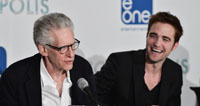 Pattinson - So, I'm sitting there thinking, can I come up with an interpretation of DeLillo that's completely original in two weeks, it's completely ridiculous.
Pattinson - So, I'm sitting there thinking, can I come up with an interpretation of DeLillo that's completely original in two weeks, it's completely ridiculous. There's something about the construction in his writing that's so easy, you don't need to add anything.
There were no rewrites. Normally that's the first thing you're thinking of as an actor, because normally the script is just shit, there's no foundation to stand on in the first place. You're so used to changing it through the whole movie. But with this, once you suddenly get to the to the idea of the thing, we're not changing any of the script, the script is fine, you are the problem, at least we know one thing.
Cronenberg - The key to it all, and is often the case, is within the script itself. It's when the Eric says to the doctor, "What are we going to do about this then?", and the Doctor replies, "Let it express itself." That's how I felt about the screenplay, let it express itself, it will organically come out of it.
Pattinson - Normally what you do is you try and connect to whoever's looking through the camera, its just easier to interpret that there's an eyeball there rather than an inanimate object. It was just so far away, it was remote controlled at the end of a technocrane, you kind of get used to having a relationship with this machine. You separate that there's any kind of human watching whatsoever watching
After a while that's kind of fun, I like not seeing anything apart from the camera, especially when it's so dark, you can't even really see what the camera was. The [Arri] Alexxa looks kind of funny as well, it doesn't even look like a normal film camera. The way the camera moved, there wasn't anything organic about the pan, it was all like clockwork.
It does change your performance.
Cronenberg - Also, I used a little Apple program called iDirector. A little green light goes on if it's OK, and a red light if you need to do another take. Pretty straightfoward, you all can use it.
Due to a conflict shooting schedules, one of the key players in the film had to fly from the set of Rock of Ages
Cronenberg - He did get confused a lot
Paul Giamatti - Fortunately the other movie wasn't terribly demanding. It was a musical that I was doing, I didn't have to sing or dance or anything, I just had to show up and crack jokes.
I was little bit pissed of that I did them at the same time, it wasn't supposed to happen that way.
I was panicked about it, this [film role] was intimidating. The length of it, the language. I was bothering everyone I could on the other movie to read this movie. Malin Akerman, she made a great Rob Pattinson. I was disappointed when I finally got here and me him.
God bless her, she read it with me over and over again because I needed to feel the security.
It was like a separate little movie, we had six days blocked out to shoot [the finale], and shot it in three. We broke the scene into big sections, we worked these big chunks of it. It was not just like a play, it was all these mini plays within the play, each section of it felt like, Jesus Christ, was that five pages? Now I've got to do another five pages!
It was intense.
There's a lot of history I have in my own mind about [Benno], so to connect things up, I don't often do this, but I made a detailed story in my head to follow through with it. It seemed to me that the basic thing that I hooked into is that I'm kind of in love with [Eric]. There's a strange love that's so strong that I hate him. I can't stand how much he's made me need him and love him, so I have to kill him. Beyond the fact that he represents the 99%, it was a guy who has gone crazy in his love for this person.
Cronenberg - You don't ask an actor to play a symbol. You don't say, you represent Wall Street, or American Capitalism, because how do you play that? You can't do that.
It's only after the fact that you can start to assign these things, and analyze them that way. On the set, you don't talk about that stuff.
Emily, what did you represent?
Hampshire - The Yuan.
Cronenberg - I thought it was jogging. OK, I have to reshoot.
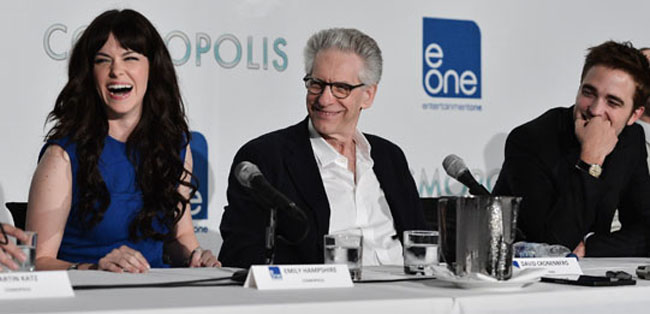
Cronenberg - It's been pointed out that the whole Occupy Wall Street movement isn't anti-Capitalist at all, it's really pro-Capitalist, it's just saying "I want in on the action". In a way, Benno is really the same. There really aren't any anti-Capitalists in the film, even though you might think it's an anti-Capitalist screed on some level.
Benno too loves loves investing, he loved working with Eric, it was just when he got excluded because Eric got too fast and too micro timed.
Giamatti - It's like he says, everyone is just ten seconds away from being rich as hell. This guy would love to jump those ten seconds.
Kevin Durand - I got a call from my agent saying David Cronenberg wants you to put this thing on tape by Tuesday, and it was like Friday, and I thought, yeah, no problem, I'm a pro. Then I looked at it.
My friend Joseph Cross, we were doing a movie together. He had a Steven Spielberg audition, and I got a David Cronenberg audition, and we got insanely obsessed. We just kept running things back and forth and saying "No, that sucks, you're wrong".
Cut to two weeks later and I felt I had cracked the code, and that's when I sent it in. I thougt, I'm too late, but I guess David thought that I cracked it.
Cronenberg - I do love that as an actors you can do a nice little self audition alone at home, take your time, do many takes, use iDirector to see if you nailed it or not. Then they send it to me, and I say, "great, just do that", so then I don't actually have to work on the set.
Pattinson - The first scene with Jay Baruchel, it didn't help that I had removed everything I could use to do the scene. I had these completely tinted out sunglasses, and this most plain suit you cold possibly have, and Jay was so scared he looked like he was going to start crying, so we sat there, both of us absolutely terrified.
We did a few more takes for that first scene than we did for later things. I think David was just bringing the calm. A lot of times when you really start to flounder is when you get it into your head that no one's really watching. You're trying to picture yourself from outside of yourself, which is impossible, and it becomes an awful experience.
It becomes a trust thing, as soon as you think someones watching, and you trust their opinion about it, you can follow your own instincts and not be detached.
Pattinson was asked by another reporter about what he brought from his own experience to the character of Eric
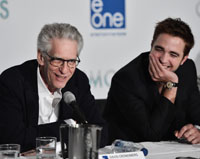 Pattinson - When we were in Cannes, someone asked that question, and David said something that I've taken into my own vernacular. He said "that's a flawed question".
Pattinson - When we were in Cannes, someone asked that question, and David said something that I've taken into my own vernacular. He said "that's a flawed question". Cronenberg - [slightly perturbed] There's nothing in his life that's equivalent to this guy's life
Pattinson - I do like saying it though! Flawed question.
The relationship with Kevin's character, it's a very specific relationship with security. That's one thing that I kind of had an idea about.
Cronenberg - Also, like the London Whale that we've been reading about, Eric is a non-celebrity, deliberately. He has security to protect him from someone who might want to kill him or kidnap him or something, but not from fans, he has no fans. He does everything in the limo, he forces people to come to him. He talks about wanting his limo to look like other limos, so that even on the street he has not distinguished himself.
Nobody knows what the London Whale looks like, and that's part of his power. It's completely different from any celebrity.
Pattinson - [Turns to David] Are you talking about the literal whale that came up the river?
Cronenberg - The Whale is the guy that just traded a couple billion dollars... [PG, EH etc. all surprised]
 Pattinson - I thought you were talking about when the whale came up the river, because that's the best metaphor for it! [laughter from all]
Pattinson - I thought you were talking about when the whale came up the river, because that's the best metaphor for it! [laughter from all]Cronenberg -That is what I meant.
Pattinson - The baby whale came up the Thames, and got stuck, and became this incredible celebrity. And I thought, that's the most beautiful idea, he's a baby whale!
On what drew Cronenberg to the book
Cronenberg - I read the book, and thought, yeah, I like this, it's complex. I also don't analyze, the way I approach the script, and the acting, brainless, braindead basically, that's the way I approach the work. There's no rules, no agenda.
Some people think I have a whole checklist of things that I look for in a project, and I don't. I was completely surprised by Cosmopolis. I was surprised that two days later I could phone and say, yeah, I want to make a movie out of this.
Certainly the whole idea of filming unfilmable novels is not in my head at all. I think they're filmable, that's why I film them. It's not as if that's a challenge or anything more than I'm looking at, on the contrary. The easier it is to do it, the happier I am, I'm fairly lazy that way.
A lot of screenwriting is abysmal. Screenwriting is a completely different writing than novel writing, and about the only thing that ends up on the screen is the dialogue. Your grammar can be bad, and often it is, from really professional filmmakers - terrible grammar, terrible spelling, inept writing, but their narrative structure's OK and their dialogue's pretty good, so you can still have a career. None of that would past muster in a novel, even a bad novel.
I do appreciate good writing. In a novelist like DeLillo, there's just such depth to what he does, and the resonances of the dialogue is fantastic. It's like the Bible, there's a quote for every situation in the screen play for Cosmopolis. I don't take any credit for it, because I just transcribed it. It's the richness, and the depth, and the complexity that you just don't get from most screenplays.
Pattinson - I just thought about something. [turns to Giamatti] You're shooting at me before I come in, and then you go to the bathroom.
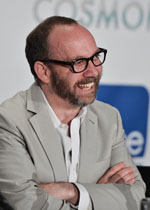
Giamatti - Yes, I know, it's really bizarre. I'm shooting at you before you come in, but how much I'm meaning to hit you or not is always a question. Do I know I want to kill you, or I'm going to kill you, or want to kill you, how much do you goad me into killing you, how much do I want you to come up and see me in my place. I'm interested in all that stuff, so I go to the toilet.
Pattinson - I hadn't even seen the set, and I just wanted to do a scene talking into the toilet bowl. The set looked good, it looked really cool.
Giamatti - The set is brilliant, because it's an office. It's my office.
Cronenberg - When a production designer gives me a great space I always use it, you get to see all of it. One of the things that actors can give me is the choreography, the movement, and how you move relative to each other, who sits in what seat. They switch seats, and power is suggested by the seat. Of course in the limo, the center seat, the throne was my idea, at the moment in which Eric abdicates, all those things mean something, even if they're not conscious of these subtle shifts in power.
In the set we have for the final 22 minute scene there's all kinds of subtle shifts of power. There's a moment when there a priest and a penetant - Eric Packer is the priest, and Benno is confessing. That's just using what was there, what was given by the design of the set.
We don't really kill Eric at the end of the movie, there's this kind of infinite moment between the two guys. It would have been easy to put a gunshot over the last shot.
It's a strange, slow moving road movie. I love the ascetic, rigorous structure of the book. It's going from East to West, moving towards Erik Packer's past. In a way it's a movement towards suicide. It's a regression.
I asked about whether the towel that Benno wears over his head was discussed - was it a priestly robe? Talis/prayer shawl? Arabic head dress? Or just a part of the 25 page scene...
Cronenberg - The towel's in the book.
Giamatti - [mantra like] The towel's in the book.
Cronenberg -The towel's in the book, the book is the Bible, you follow the Bible...
Giamatti - I had one phone conversation with David, just to check in with him before I had to do it, and I asked, "what's the deal with the towel?" And he said, "I don't know". So I asked, "should I read the book?", and he said "don't, don't read the book".
So of course I went immediately to go read the book, and realized two pages into it he was right.
I wasn't just going to see what Don DeLillo said about the towel. The interesting thing is, when we were in Cannes a lot of people were asking me about the towel, I had to kind of construct a whole thing in my head to make some sense of it. Because I have this towel around my head, I thought to myself, I should know why I have this towel around my head.
I do know why I have this towel around my head, but I'm not going to tell you.
Cronenberg - Some things are much more explicit in the book, because in a novel, especially a Don DeLillo novel, you can get inside the character's head in very abstract and detailed ways which we did not get in the movie. In a way, we are more ambiguous and implicit than the novel, which is in some ways more explicit.
Giamatti - Which is why I was glad I didn't read it, because then I could make up something that was much more vital for me to have made it up, than if I think I'd read about it.
There were certain actors I said should read the book, and certain ones I said shouldn't. It had to do with their education, their intelligence, and their emotional stability.
I had to make decisions, at the end of the day, Benno might be who he says he is. [As Benno] I talk about how, if I believe it, it's true, whatever I can believe is true. I've really no idea who this guy really is.
Pattinson - He could be a baby whale!
Giamatti - They could be two little baby whales.

Do you feel this content is inappropriate or infringes upon your rights? Click here to report it, or see our DMCA policy.






